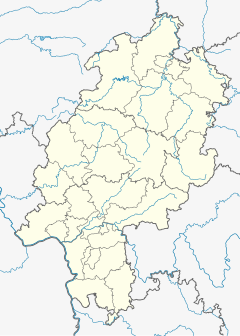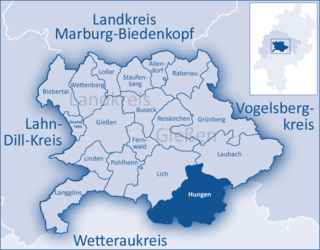
Hungen is a town in the district of Gießen, in Hesse, Germany. It is situated 20 km southeast of Gießen, and 18 km northeast of Friedberg. Surrounding towns are Laubach to the north, Nidda to the east, Wölfersheim to the south, and Münzenberg and Lich to the west.

Schotten is a town in the middle of Hesse, Germany. Larger towns nearby include Alsfeld in the north, Fulda in the east, Friedberg in the south and Gießen in the west.

The Grand Duchy of Hesse State Railways belonged to the Länderbahnen at the time of the German Empire. In the 19th century, the Grand Duchy of Hesse consisted of three provinces. Between the rivers Rhine, Main, and Neckar, the province of Starkenburg embraced the Odenwald and the Hessian Ried. It also included the ducal residence of Darmstadt. West of the Rhine was the province of Rhenish Hesse (Rheinhessen), with the towns of Mainz, Worms, and Bingen. The province of Upper Hesse (Oberhessen), which included the Vogelsberg and the Wetterau, was not directly linked by land to the others. As a result of its lack of territorial integrity, the state did not initially build its own state railway. Rather, it took part in joint state railway projects with its neighbouring states. These were the:
The Upper Hessian Railway Company was a private concern whose aim was to build and run railway lines in the province of Upper Hesse in the Grand Duchy of Hesse, a state within the German Empire in the 19th and early 20th centuries.

Frankfurt-Rödelheim station is a regional and S-Bahn station in western Frankfurt am Main, Germany on the Homburg line, in the district of Rödelheim. The Kronberg line branches off the Homburg line north of the station. The junction with the Rebstock curve of the former Bad Nauheim–Wiesbaden line (Bäderbahn) is south of the station. The station connects with several bus lines.
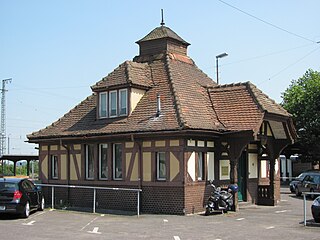
Friedberg (Hess) station is the station of Friedberg, Germany, on the Main-Weser Railway.
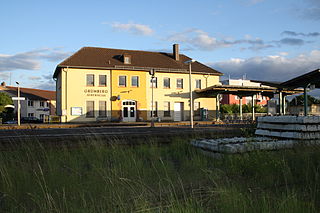
Grünberg (Oberhess) is a station in the town of Grünberg in the German state of Hesse. The stations of Lehnheim and Göbelnrod are also in Grünberg. It is located 23.2 kilometres from Gießen station on the Vogelsberg Railway (Vogelsbergbahn), which continues to Fulda. In the past, the Lumda Valley Railway (Lumdatalbahn) to Londorf and Lollar branched off here and the Butzbach–Lich railway to Butzbach via Lich and Münzenberg.
Mücke (Hess) station is a Keilbahnhof and, along with Nieder Ohmen station, is one of two remaining stations in the municipality of Mücke, Hesse, Germany. It is located between the two Mücke districts of Flensungen and Merlau, 28.9 kilometres from Gießen on the Vogelsberg Railway (Vogelsbergbahn), which continues to Fulda. Previously, the Friedberg–Mücke railway branched off here via Laubach and Hungen to Friedberg.
The Gießen–Fulda railway is a single-track main line from Gießen via Alsfeld to Fulda in the German state of Hesse.
The Gießen–Gelnhausen railway is a single-track, non-electrified mainline in the German state of Hesse. It runs from Gießen via Nidda to Gelnhausen.

Nidderau station is a junction station on the Friedberg–Hanau railway and the Nidder Valley Railway in the town of Nidderau in the German state of Hesse. The station is classified by Deutsche Bahn (DB) as a category 5 station.

Nidda station is a station on the Gießen–Gelnhausen railway in the town of Nidda in the German state of Hesse. It is also at the end of the Beienheim–Schotten railway from Friedberg station. The station is classified by Deutsche Bahn (DB) as a category 4 station.

Glauburg-Stockheim station is a station on the Gießen–Gelnhausen railway in the town of Glauburg in the German state of Hesse. It is also at the end of the Nidda Valley Railway from Bad Vilbel. The Oberwald Railway (Oberwaldbahn) to Lauterbach began here from 1 October 1888 until 1 June 1984. The station is classified by Deutsche Bahn (DB) as a category 5 station.

Hungen station is a station on the Gießen–Gelnhausen railway in the town of Hungen in the German state of Hesse. From 1 June 1890 to 4 April 2003, the Friedberg–Mücke railway branched off to Mücke via Laubach and to Friedberg via Wölfersheim and Beienheim. The station is classified by Deutsche Bahn (DB) as a category 6 station.

Bad Vilbel station is located at the 183.6 kilometre mark of the Main-Weser Railway in the town of Bad Vilbel in the German state of Hesse. The Nidder Valley Railway branches from Bad Vilbel via Nidderau to Glauburg-Stockheim. It is classified by Deutsche Bahn as a category 3 station.

The is a large volcanic mountain range in the German Central Uplands in the state of Hesse, separated from the Rhön Mountains by the Fulda river valley. Emerging approximately 19 million years ago, the Vogelsberg is Central Europe's largest basalt formation, consisting of a multitude of layers that descend from their peak in ring-shaped terraces to the base.

The Friedberg–Mücke railway is a railway that was opened in 1890/97 in the Wetterau and Vogelsberg regions in the German state of Hesse. Sections of the line are also called the Horlofftalbahn and the Seentalbahn. It originally connected three major railways that run from Giessen, namely:

The Beienheim–Schotten railway is a railway in the Horloff and the Nidda valleys in the Wetteraukreis in the German state of Hesse. Its western section is also called the Horlofftalbahn.
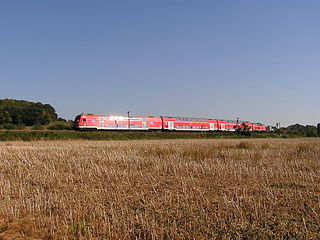
The Bad Vilbel–Glauburg-Stockheim railway is a non-electrified branch line in the Wetterau and the Main-Kinzig districts of the German state of Hesse. It connects the Main-Weser Railway in Bad Vilbel with the Gießen–Gelnhausen railway in Glauburg-Stockheim.
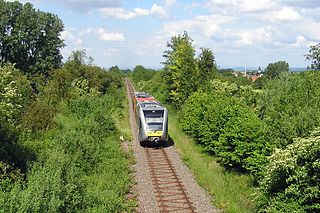
The Friedrichsdorf–Friedberg railway is a single-track, non-electrified branch line in the German state of Hesse. It is listed as timetable route 636 and integrated in the Rhein-Main-Verkehrsverbund as line 16.

